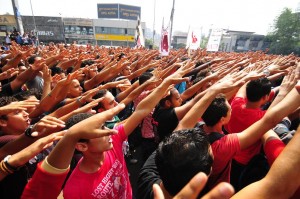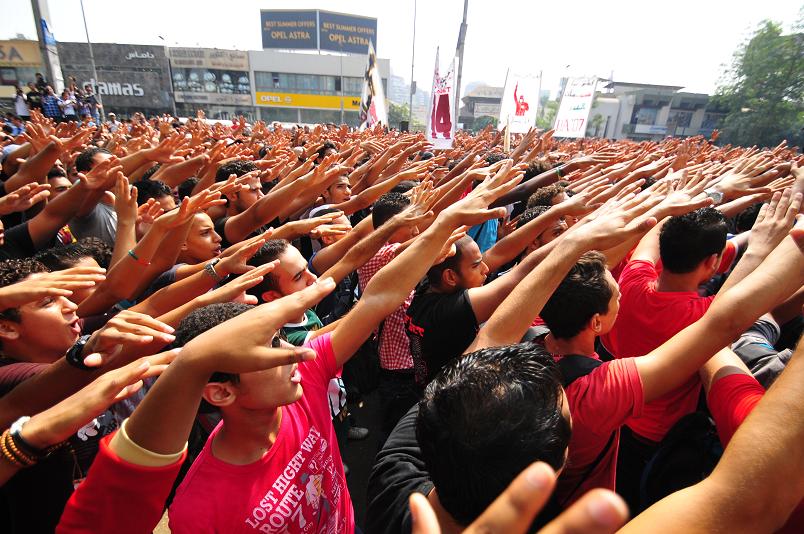
Hassan Ibrahim / DNE
Ultras Ahlawy demonstrated on Tuesday in the way they do best, by joining en masse to chant and wave banners.
Over four hundred supporters of the Cairo-based Al-Ahly football club demonstrated in front of the Ministry of State for Sports in Mohandeseen.
The Ultras are upset over recent appeals to the ministry that the Egyptian Premier League be resumed.
A string of demonstrators held signs along the freeway traffic of 26 July Street, as another supporter used a marker and the trunk of a car to write new signs. As he wrote, he said even though others have appealed to the sports ministers, “we are here to say that they cannot play while there is still blood on the field.”
The blood is a reference to the Port Said massacre in February where 74 supporters of Al-Ahly were killed in post match clashes. Supporters are furious that no one has been convicted for allowing the deaths to occur, and they widely suspect that the killing was allowed to happen as retribution for the role the Ultras played in the revolution.
“We are here because they killed our friends in Port Said,” said another supporter. “We want to tell the sports ministry not to play the Egyptian league until they kill those who killed our friends.” As he spoke he backed away from a freeway advertisement that was being precariously mounted by a young boy swinging a 15 foot banner.
The scene in front of the ministry building had the same stadium atmosphere that the Ultras have brought to places like Mohamed Mahmoud and Tahrir Square during both the revolution and its fallout.
The hundreds of young men jumped in unison and sang songs about Port Said, called out to Sports Minister El-Amry Farouk, and chanted “Ahly! Ahly! No return to the league!” They were dressed in red Ahly jerseys or those of their favourite European clubs, their hair was moussed or covered in baseball hats, and they chain-smoked between songs.
The chants were led by Karim Adel, the charismatic Ultras leader who stood on the shoulders of supporters and directed the crowd like an orchestra conductor. After the first call and response, Adel shook his head in mock shame at the crowd’s volume. They responded with a thundering single voice.
Sixty armoured riot police stood in single file in front of the building’s gates, with more security men waiting in trucks that filled the side streets. But the Ahly fans were not deterred. As the chanting progressed, minibuses continued to pull up to the crowd with fans hanging out the windows and pouring out the door.
A pause between chanting allowed the young men to drink water and many of the family members of those who died at Port Said to speak to the crowd. Women in black niqabs sat side by side, grief-stricken, with portraits of their deceased sons in their hands.
The father of 20 year-old Omar Mohsen who was killed at Port Said, said he found guilt everywhere, but directed particular blame at Hany Abou-Reida, chairman of the Egyptian Football Association. “How can you think of playing football right now?” he asked. “How can you think of it?”
The visages of those who died in Port Said were everywhere on Tuesday, printed on the shirts of their peers and adorned on banners, the faces of the 74 victims nearly outnumbered the ubiquitous gold eagle of Ahly’s crest.
It was a strange sight, hundreds of football fans passionately protesting the start of their favourite league. A teenage supporter who was sitting on a cement barrier with half a dozen friends, said, “Of course we want to watch football, because we are fans.”
The young supporter continued, “yesterday the media and others came here and said they want the season to start, because they want that money.” This is the notion that so disgusts family members and comrades of those who died at Port Said, the fact that progress is being made for a return to profit-making while the court case remains stalled.
“It’s not just about their memories,” said the boy sitting amongst his friends, “it’s about justice.”


